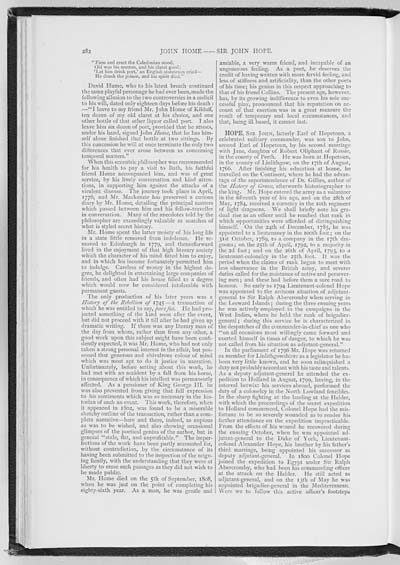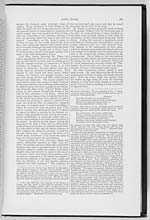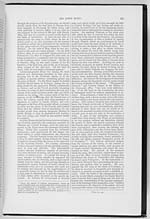282
"Firm and erect the Caledonian stood,
Old was his mutton, and his claret good;
' Let him drink port,' an English statesman cried�
He drank the poison, and his spirit died."
David Hume, who to his latest breath continued
the same playful personage he had ever been, made the
following allusion to the two controversies in a codicil
to his will, dated only eighteen days before his death :
�"I leave to my friend Mr. John Home of Kilduff,
ten dozen of my old claret at his choice, and one
other bottle of that other liquor called port. I also
leave him six dozen of port, provided that he attests,
under his hand, signed John Hume, that he has him-
self alone finished that bottle at two sittings. By
this concession he will at once terminate the only two
differences that ever arose between us concerning
temporal matters."
When this eccentric philosopher was recommended
for his health to pay a visit to Bath, his faithful
friend Home accompanied him, and was of great
service, by his lively conversation and kind atten-
tions, in supporting him against the attacks of a
virulent disease. The journey took place in April,
1776, and Mr. Mackenzie has preserved a curious
diary by Mr. Home, detailing the principal matters
which passed between him and his fellow-traveller
in conversation. Many of the anecdotes told by the
philosopher are exceedingly valuable as snatches of
what is styled secret history.
Mr. Home spent the latter moiety of his long life
in a state little removed from indolence. He re-
moved to Edinburgh in 1779, and thenceforward
lived in the enjoyment of that high literary society
which the character of his mind fitted him to enjoy,
and in which his income fortunately permitted him
to indulge. Careless of money in the highest de-
gree, he delighted in entertaining large companies of
friends, and often had his house filled to a degree
which would now be considered intolerable with
permanent guests.
The only production of his later years was a
History of the Rebellion of 1745 � a transaction of
which he was entitled to say, pars fui. He had pro-
jected something of the kind soon after the event,
but did not proceed with it till after he had given up
dramatic writing. If there was any literary man of
the day from whom, rather than from any other, a
good work upon this subject might have been confi-
dently expected, it was Mr. Home, who had not only
taken a strong personal interest in the affair, but pos-
sessed that generous and chivalrous colour of mind
which was most apt to do it justice in narration.
Unfortunately, before setting about this work, he
had met with an accident by a fall from his horse,
in consequence of which his intellect was permanently
affected. As a pensioner of King George III. he
was also prevented from giving that full expression
to his sentiments which was so necessary in the his-
torian of such an event. This work, therefore, when
it appeared in 1802, was found to be a miserable
sketchy outline of the transaction, rather than a com-
plete narrative�here and there, indeed, as copious
as was to be wished, and also showing occasional
glimpses of the poetical genius of the author, but in
general "stale, flat, and unprofitable." The imper-
fections of the work have been partly accounted for,
without contradiction, by the circumstance of its
having been submitted to the inspection of the reign-
ing family, with the understanding that they were at
liberty to erase such passages as they did not wish to
be made public.
Mr. Home died on the 5th of September, 1808,
when he was just on the point of completing his
eighty-sixth year. As a man, he was gentle and
amiable, a very warm friend, and incapable of an
ungenerous feeling. As a poet, he deserves the
credit of having written with more fervid feeling, and
less of stiffness and artificiality, than the other poets
of his time; his genius in this respect approaching to
that of his friend Collins. The present age, however,
has, by its growing indifference to even his sole suc-
cessful play, pronounced that his reputation on ac-
count of that exertion was in a great measure the
result of temporary and local circumstances, and
that, being ill based, it cannot last.
HOPE, SIR JOHN, latterly Earl of Hopetoun, a
celebrated military commander, was son to John,
second Earl of Hopetoun, by his second marriage
with Jane, daughter of Robert Oliphant of Rossie,
in the county of Perth. He was born at Hopetoun,
in the county of Linlithgow, on the 17th of August,
1766. After finishing his education at home, he
travelled on the Continent, where he had the advan-
tage of the superintendence of Dr. Gillies, author of
the History of Greece, afterwards historiographer to
the king. Mr. Hope entered the army as a volunteer
in the fifteenth year of his age, and on the 28th of
May, 1784, received a cornetcy in the 10th regiment
of light dragoons. We shall briefly note his gra-
dual rise as an officer until he reached that rank in
which opportunities were afforded of distinguishing
himself. On the 24th of December, 1785, he was
appointed to a lieutenancy in the 100th foot; on the
31st October, 1789, to a company in the 17th dra-
goons; on the 25th of April, 1792, to a majority in
the 2d foot; and on the 26th of April, 1793, to a
lieutenant-colonelcy in the 25th foot. It was the
period when the claims of rank began to meet with
less observance in the British army, and severer
duties called for the assistance of active and persever-
ing men; and these had before them a sure road to
honour. So early as 1794 Lieutenant-colonel Hope
was appointed to the arduous situation of adjutant-
general to Sir Ralph Abercromby when serving in
the Leeward Islands; during the three ensuing years
he was actively employed in the campaigns in the
West Indies, where he held the rank of brigadier-
general; during this service he is characterized in
the despatches of the commander-in-chief as one who
"on all occasions most willingly came forward and
exerted himself in times of danger, to which he was
not called from his situation as adjutant-general."
In the parliament of 1796 Mr. Hope was returned
as member for Linlithgowshire: as a legislator he has
been very little known, and he soon relinquished a
duty not probably accordant with his taste and talents.
As a deputy adjutant-general he attended the ex-
pedition to Holland in August, 1799, having, in the
interval betwixt his services abroad, performed the
duty of a colonelcy in the North Lowland fencibles.
In the sharp fighting at the landing at the Helder,
with which the proceedings of the secret expedition
to Holland commenced, Colonel Hope had the mis-
fortune to be so severely wounded as to render his
farther attendance on the expedition impracticable.
From the effects of his wound he recovered during
the ensuing October, when he was appointed ad-
jutant-general to the Duke of York, Lieutenant-
colonel Alexander Hope, his brother by his father's
third marriage, being appointed his successor as
deputy adjutant-general. In 1800 Colonel Hope
joined the expedition to Egypt under Sir Ralph
Abercromby, who had been his commanding officer
at the attack on the Helder. He still acted as
adjutant-general, and on the 13th of May he was
appointed brigadier-general in the Mediterranean.
Were we to follow this active officer's footsteps

![]() Universal Viewer |
Universal Viewer | ![]() Mirador |
Large image | Transcription
Mirador |
Large image | Transcription
![]()

